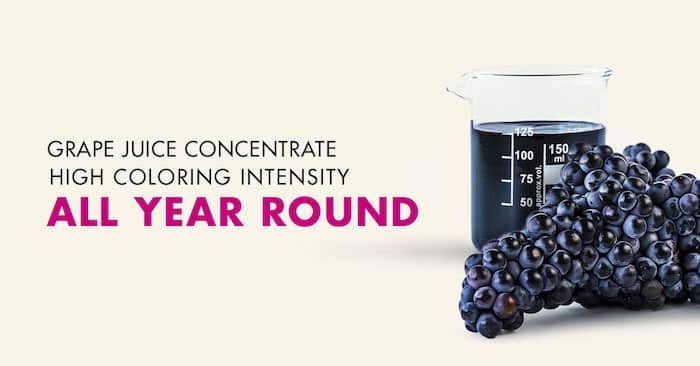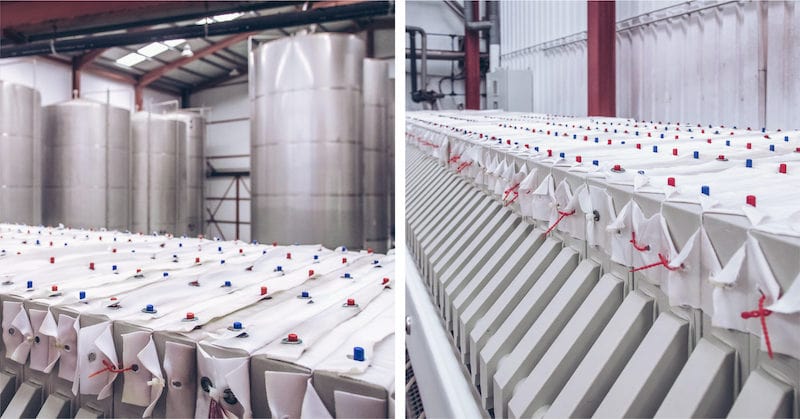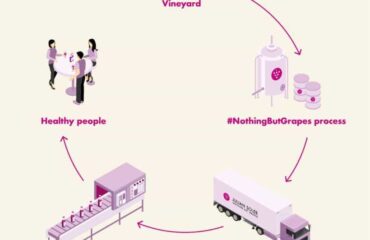The rise of the quest for wellness among consumers is driving the global alcoholic beverage industry to incorporate alternatives with little or no alcohol. Within this sector, wine producers have adapted to these new healthy trends and are also incorporating in their offer various non-alcoholic or low-alcoholic wine options, with flavours or bodies very similar to alcoholic wines.
But knowing that winemaking starts with grape juice concentrate, it is natural that questions arise: is alcohol-free wine just grape juice concentrate, what does grape juice concentrate contain, or does grape juice concentrate have a certain alcohol content? In this post we focus on clarifying that grape juice concentrate does not contain alcohol. Therefore, we explain what grape juice concentrate is and what it consists of. In addition, we detail its differences with wine and briefly explain the process of making a non-alcoholic wine.
- What is grape juice concentrate and what does it consist of?
- Wine without alcohol is not grape juice concentrate
- Julian Soler: all the essence of the grape in grape juice concentrate
What is grape juice concentrate and what does it consist of?

Grape juice concentrate is freshly squeezed, unfermented, natural grape juice. It is obtained from fresh grapes that have undergone crushing and pressing processes. Basically, in these operations, the skin of the grapes (skin) is broken and the pulp is crushed in order to extract the juice. Therefore, in addition to water, this initial grape juice concentrate also contains solid components, such as stems, skins and seeds of the grapes, which together are called ‘pomace’. The grape juice concentrate is then filtered to remove impurities and solids. As can be seen, the grape juice concentrate does not contain alcohol in its composition, because its production does not involve fermentation processes.
But grape juice concentrate is the basis for making wine. After being sieved, this concentrated juice has to settle in stainless steel tanks at controlled temperatures. There it triggers the natural fermentation process, where the natural sugars are converted into alcohol. Generally, to accelerate and optimise this process, yeasts are added. From the fermented grape juice concentrate, alcoholic and non-alcoholic wines and other products with a certain alcoholic content can be produced. For example, products mentioned by the International Wine Organisation OIV include:
- A drink obtained by partial dealcoholisation of wine or “partially dealcoholised wine”. It is obtained only from wines that have undergone dealcoholisation processes. Its alcoholic strength is equal to or greater than 0.5% vol. but less than the minimum strength that applies to wine (8.5% vol.).
- A beverage obtained by dealcoholisation of wine or “dealcoholised wine”. It is also obtained exclusively from wines that have undergone dealcoholisation. It has an alcoholic strength of less than 0.5% vol.
- Slightly sparkling grape drink. It is made from the partial fermentation of grape must. Its alcohol content does not exceed 3% vol.
- Wine vinegar. Made exclusively from the acetic fermentation of wine. Its maximum ethanol content is 4% vol.
What types of grape juice concentrates are there?
There are several types of grape juice concentrates, but none of them contain alcohol. For example:
| Flower grape juice concentrate or yolk grape juice concentrate (simple grape juice concentrate) | It is the first juice obtained after the grapes have been gently crushed, when they are emptied into the hopper that will take them to the press. It is a fluid that emerges from the grapes without being pressed. It is widely used in the production of white wines. |
| Press fraction grape juice concentrate. | This corresponds to the grape juice concentrates obtained after the crushing process, which is obtained by subjecting the grapes to different levels of pressure. As the pressure exerted on the grapes increases, the quality of the resulting grape juice concentrate also increases and the levels of polyphenols, vitamins and minerals rise, because it becomes richer in the components derived from the grape solids (skin and seeds). It is used in the production of wines with more intense flavours and colours. |
| Grape juice concentrate | It is a higher density grape juice concentrate obtained by extracting ⅔ of the water from the crushed and pressed grape juice, by means of a vacuum evaporation process. It is a product that preserves the aroma, acidity, texture and sugars of the grape intact. Grape juice concentrate is the most recommended for the production of high quality wines, because it enhances their flavour and helps them to reach the desired levels of acidity, aromas and sugars. |
| Deionised grape juice concentrate | It is obtained from the partial dehydration of white grape juice concentrate and the elimination of all its components except the natural sugars. It is therefore a highly viscous, colourless, odourless liquid with a high sweetening power. |
At Julián Soler we are producers of sustainable white and red grape juice concentrates. We have designed a unique process to obtain grape juice free of preservatives, additives and allergens. We also produce deionised grape juice concentrate in the tonality and concentration required by our customers.
Wine without alcohol is not grape juice concentrate
Non-alcoholic wine is definitely not grape juice or grape juice concentrate. But to understand even more, let’s look at the difference between these two products and what the process of de-alcoholisation of wine consists of:
Difference between non-alcoholic wine and grape juice concentrate
| Grape juice concentrate | Alcohol-free wine or “de-alcoholised wine”. | |
| In winemaking | It is the raw material for wine production. | It is a product obtained after eliminating the alcohol present in the wine. |
| Alcoholic content | Does not contain alcohol | Less than 0.5% vol. |
| Who is the target audience? | Targeting broad sectors and consumers: 1) the food and beverage industry (production of juices, wines, de-alcoholised or partially de-alcoholised wines, functional and nutritional beverages, sweeteners, colourings, sweets, etc.) 2) the cosmetics industry (as an ingredient in moisturising and anti-ageing creams, lotions and serums) 3) the pharmaceutical industry (in resveratrol supplements, various medicines for the treatment of hypertension). 4) Recommended for consumers who are demanding in their diet or who need to consume nutritious drinks, such as athletes, pregnant women and children. | Especially aimed at consumers who want to enjoy the taste and aroma of good wine, but want or need to eliminate the alcoholic content, such as: athletes, pregnant women, people who are careful with their diet or individuals who profess certain religions or who have a special health condition. |
Filtration process of grape juice concentrate

First of all, it is necessary to obtain high quality wine. Then, the wine must undergo a process to carefully remove the alcohol. The main dealcoholisation methods are as follows:
- Vacuum distillation. A process in which the alcohol is removed by subjecting the wine to a temperature between 25 and 30 °C.
- Rotating cone columns. This process uses low temperatures to produce repeated evaporation and condensation. In addition, inverted cones and the aid of centrifugal forces are used to separate the constituent elements and remove the alcohol. The elements are then mixed again.
- Reverse osmosis. This process involves using a cross-flow filtration system to separate the wine’s constituent elements according to different molecular sizes. The alcohol is removed and then the elements are blended again.
This process produces a product that is ready for consumption. However, depending on the type of non-alcoholic wine to be produced, it is usual to add grape juice concentrate to the dealcoholised wine obtained in order to refine flavours or modify textures. It can even go through the same ageing process as the wine. Of course, the final quality of the dealcoholised wine will depend mainly on the quality of the grape juice used.
Julian Soler: all the essence of the grape in grape juice concentrate
At Julián Soler we produce grape juice concentrate from white and red grapes, 100% natural and SO2 Free. We only use fresh grapes harvested at their optimum point of ripeness, preserving their natural properties, antioxidants and minerals. In addition, our processes are framed in a food safety standard of the highest level, so we can guarantee the quality of our products.
Thanks to our extensive export experience, we can deliver the grape juice concentrate to any country in the world, wherever you need it and at any time of the year. We adapt the packaging to your requirements. Contact us. At Julián Soler we deliver all the essence of the grape in white and red grape juice concentrate.
Sources: OIV, MINTEL, Decanter, Sciencedirect, Edenvale, Julián Soler.




 by
by